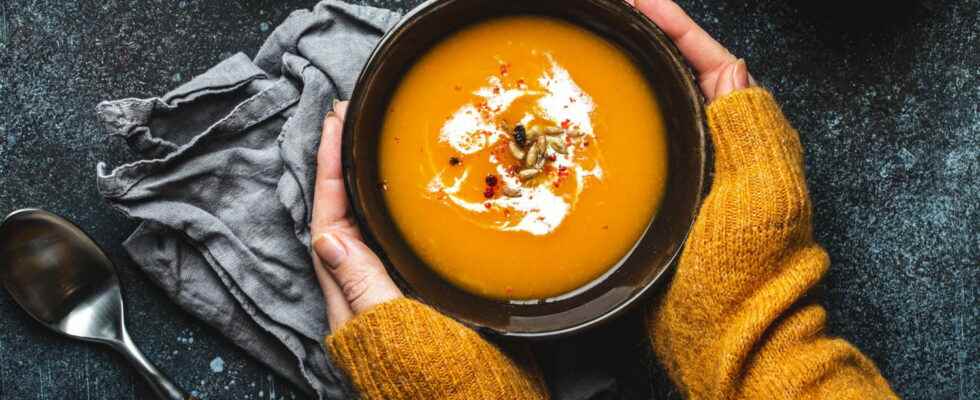When temperatures are very low, food has a role to play in warming up. What are the preferred foods? Should we eat more? Fatter? Which fruits and vegetables to choose? Advice from Brigitte Coudray, nutritionist-dietician.
Temperatures drop. Raclette, fondue, tartiflette, pierrade, soup with cream… We tend to eat gourmet dishes that are high in calories when we are cold. “It has to stick to the body“as we like to say. But is this habit of eating more fat when it’s cold really good for our body? What to eat to warm up and withstand low temperatures? Insight from Brigitte Coudray, nutritionist and dietician.
Should we eat more when it’s cold?
“No, in winter it is useless to feed more than usual, unless you work outside“, warns Brigitte Coudray from the outset Indeed, our lives (mostly urban and sedentary) do not confront us with low temperatures… Our apartments, houses and work offices are generally well heated and time spent outdoors is restricted. “Nothing justifies eating more during the winter, our body does not really spend more energy than during the other seasons of the year. Our caloric intake must therefore remain the same ! On the other hand, what explains our greatest desire for “fat” is above all our desire to stay warm longer and to reassure ourselves with cocoon foods to chase away the spleen of days without light…”. Also, nothing prevents you from cracking up from time to time for a good raclette!
What to eat when it’s cold?
► Warming fish
“In winter, our bodies are much less exposed to light… and therefore, to vitamin D !”, explains our specialist. Indeed, the sun helps us to synthesize this vitamin in our body in order to boost our immune system. To overcome this lack and stay healthy, it is important to consume oily fish, egg yolks or dairy products. “Food supplemented with vitamin D is not sufficient in the event of deficiencies… You should not hesitate to turn to your general practitioner for a prescription of vitamin D vials“, emphasizes Brigitte Coudray again.
► Fruits that warm
Compared to summer and our increased need for freshness, winter is less conducive to the consumption of fruit… However, it is important to boost our immune defenses to avoid small (or large) infections. “As for fruits and vegetables, I recommend favoring seasonal fruits with a high vitamin C content and vegetables rich in fiber, such as:
- Clementine
- The kiwi
- orange
- Grapefruit
- The pumpkin
- parsnip
- gourds
- Turnip
- The leek
- The carrot…
Breakfast to warm up
- A hot drink: tea or coffee
- Butter bread
- A yogurt
- A squeezed orange
Lunch to warm up
- Celery and apple remoulade sauce
- Salmon and steamed potatoes
- Fromage blanc with walnuts
- Pineapple
- Bread
Dinner to warm up
- Cream Of Chestnuts
- Quiche with spinach and salad
- Cheese
- Fruit compote
- Bread
Can you go on a diet when it’s cold?
“There is no contraindication to continuing a diet started before winter“Assures Brigitte Coudray. On the other hand, weight loss is often associated with physical activity and in winter we are not really willing to put our noses outside to run!”JI advise you to continue your diet while maintaining an indoor sport, such as indoor gym for example“.
Thanks to Brigitte Coudray, nutritionist and dietitian.
